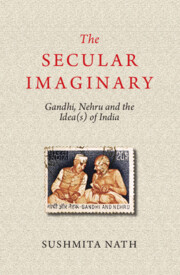Book contents
- Frontmatter
- Contents
- Preface
- Acknowledgements
- Introduction
- 1 Debating the Secular beyond the West
- 2 Gandhi’s Ashram and Political Thought: A Counter-narrative of Secularity
- 3 Gandhi’s Associationalism: A Non-state Alternative to Liberal Secularism?
- 4 Was Nehru Nehruvian? Religion, Secularity and Nehruism
- 5 Nehru and the Politics of Liberalism of Fear
- Conclusion
- Bibliography
- Index
4 - Was Nehru Nehruvian? Religion, Secularity and Nehruism
Published online by Cambridge University Press: 27 September 2022
- Frontmatter
- Contents
- Preface
- Acknowledgements
- Introduction
- 1 Debating the Secular beyond the West
- 2 Gandhi’s Ashram and Political Thought: A Counter-narrative of Secularity
- 3 Gandhi’s Associationalism: A Non-state Alternative to Liberal Secularism?
- 4 Was Nehru Nehruvian? Religion, Secularity and Nehruism
- 5 Nehru and the Politics of Liberalism of Fear
- Conclusion
- Bibliography
- Index
Summary
As far as India is concerned, I can speak with some certainty. We shall proceed on secular and national linesin the future, India will be a land, as in the past, of many faiths equally honoured and respected. (Jawaharlal Nehru, An Address at the Aligarh Muslim University, 24 January 1948)
There is an essential unity about it [India] and India is also a country with very remarkable diversity, and the problem in India is to maintain both, not to crush the diversity and obviously not to lessen the unity. (Jawaharlal Nehru, Speech at the 40th Session of the Indian Science Congress, 2 January 1953)
INTRODUCTION
In both his personal and political life, Nehru stands diametrically opposed to Gandhi, stridently Western in his demeanour, outlook and politics. While independence for Gandhi meant the historical opportunity to move out of the forcible imposition of Western modernity on India, for Nehru modernity was a universally desirable condition which was impeded due to British colonial rule. India's nationalist leaders had diverse and often contending ideas of India as a political community, but Nehru's vision of society dominated years after independence – a nationalist leader and the first prime minister of independent India – who, as Sunil Khilnani remarks, was ostensibly the most anglicised of them all. As is well known, in terms of their vision of Indian society in its relation to modernity, Nehru and Gandhi stood on opposite ends. Unlike Gandhi, Nehru, an unapologetic modernist, did not seek to reform pre-modern social formations to changing conditions of modernity. Instead, Nehru's idea of India was based on a belief in modernity as progress which required overcoming pre-modern social formations, not reconfiguring it. If Gandhi desired his ideal of the nation realised in India's village life, Nehru's vision of modern India lay in industrialisation. And yet Gandhi and Nehru shared an intimate and intriguing political relationship, with the latter being Gandhi's protégéand political successor. As the leader of the Indian National Congress (hereafter, the Congress) and the new nation-state, Nehru's modern and secular vision directly influenced independent India's polity and society for seventeen years, initially heading the interim legislature (1947–1952) and thereafter winning three successive general elections (1952, 1957 and 1961).
- Type
- Chapter
- Information
- The Secular ImaginaryGandhi, Nehru and the Idea(s) of India, pp. 141 - 191Publisher: Cambridge University PressPrint publication year: 2022



